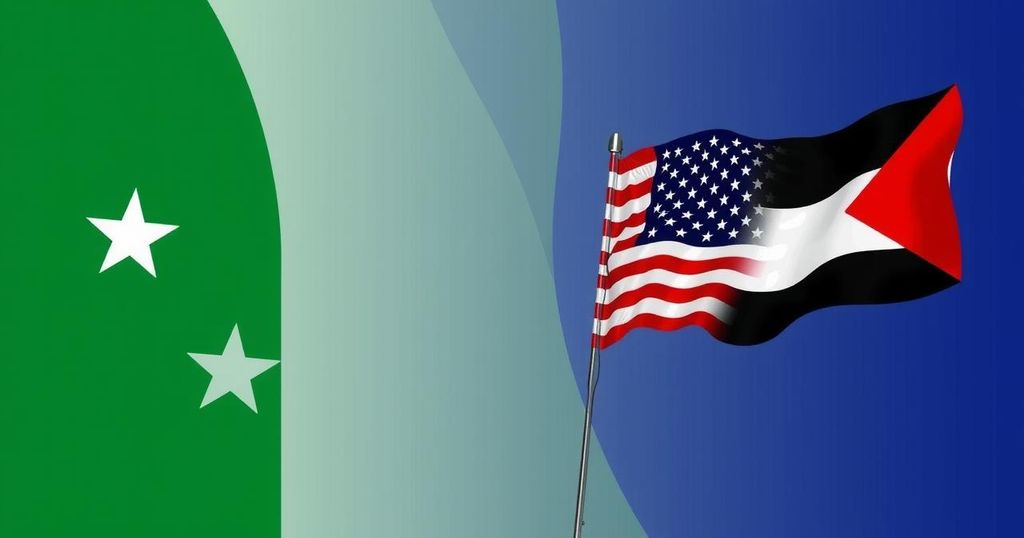Saudi Arabia Shifts Defense Strategy Amid Stalemate on Palestinian Statehood
Saudi Arabia has abandoned its pursuit of a substantial defense treaty with the United States that linked normalization with Israel to Palestinian statehood. Crown Prince MbS insists that any normalization must depend on Israel’s commitment to an independent Palestine. A simpler defense agreement is now being sought before the conclusion of President Biden’s term. This situation unfolds amid ongoing tensions between Israel and Hezbollah in Lebanon, impacting broader regional stability.
Recent reports indicate that Saudi Arabia has halted its pursuit of a defense treaty with the United States that was tied to the normalization of relations with Israel. Sources from Reuters revealed that Saudi Crown Prince Mohamed bin Salman (MbS) has reiterated a firm stipulation: normalization must be contingent upon Israel’s commitment to advancing the establishment of an independent Palestinian state, as outlined in the 2002 Arab Peace Initiative. Israeli Prime Minister Benjamin Netanyahu, meanwhile, remains keen on securing a historic normalization with Saudi Arabia, yet is aware that any movement towards a two-state solution could jeopardize his ruling coalition’s stability.
Consequently, both Riyadh and Washington are now striving for a simpler defense agreement ahead of President Joe Biden’s departure from office in January. Earlier in the year, Saudi Arabia’s ambition was to negotiate a defense treaty with the U.S. that included enhanced military support and a potential nuclear program, all in exchange for normalized ties with Israel. However, Saudi Arabia has maintained that such normalization is predicated on genuine efforts toward Palestinian statehood, which Israel has consistently opposed. The Guardian reported in May that Saudi Arabia began to shift its focus towards a more modest defense pact due to Israel’s obstinacy regarding Palestinian independence.
This shift occurs against the backdrop of an uncertain ceasefire between Hezbollah and Israel in Lebanon, which the Biden administration views as a step closer to a more integrated West Asia. “I applaud the courageous decision made by the leaders of Lebanon and Israel to end the violence. It reminds us that peace is possible,” President Biden stated recently. While the ceasefire is fragile, Israel’s actions of violating it with military strikes have raised concerns. The U.S. President reiterated America’s willingness to facilitate a peace agreement between Israel and Saudi Arabia that prioritizes the establishment of a viable Palestinian state.
The dynamics of Middle Eastern diplomacy have been notably influenced by Israel’s longstanding conflict with the Palestinians. Saudi Arabia, as a leading Arab nation, has held that any formal relations with Israel should coincide with substantial progress towards the establishment of Palestine as a recognized state. The 2002 Arab Peace Initiative, proposed by Saudi Arabia, called for normalized relations in exchange for a definitive resolution to the Palestinian issue. The geopolitical landscape continues to evolve as both regional powers and international stakeholders, particularly the U.S., navigate these complex negotiations.
In summary, Saudi Arabia’s decision to forgo an expansive defense treaty with the United States in favor of a more modest pact underlines the prevailing influence of the Palestinian statehood issue in regional diplomacy. While Saudi Arabia seeks actionable commitments from Israel, the delicate balance of power within the Israeli government poses challenges to such negotiations. The broader context of international relations and the fragile ceasefire in Lebanon further complicate the pursuit of lasting peace. The outcome of these discussions is paramount, as they hold significant implications for regional stability and the prospect of Palestinian independence.
Original Source: thecradle.co




Post Comment